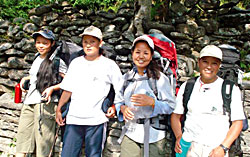 SURYA CHANDRA BASNYAT |
If you decide to trek in the Gauri Shankar area, the spectacular panoramic view of the mountains will not be the only thing that will catch your eye. Your guides and porters are most likely to be women.
Here at Simi village in Dolakha, women are being trained to be guides under a unique eco-tourism project that aims to reduce poverty by boosting grassroots tourism.
"The main occupation of the people in Simi is trekking and it has increased family income," says Tseringdipi Sherpa. "In other places, the men go out to work and the women stay home, but here women work as guides and the men farm."
The majestic twin peaks of the 7,181-metre-high Gauri Shankar dominates the sky above Simi. The land is rugged and villagers depend on the rains to grow potato and millet. Northern Dolakha has always been poor, but with trekking family incomes are rising, children are going to school and people can afford solar lights.
Simi hit the headlines last year when three young women from the village, Pujan Acharya, Nimadoma Sherpa and Pembadiki Sherpa, all climbed Chomolungma. They were neighbours who worked as trekking guides and became interested in mountaineering.
This seems to have inspired Simi women to look beyond Dolakha. Tsering herself has taken tourists to Khumbu and the Annapurnas. "We've been trekking since we were kids," she says, "so it's not such hard work." And Tsering says they also enjoy the freedom and adventure that comes with being guides. Some Simi women have set up trekking shops in Kathmandu.
Simi and the Rolwaling Valley saw a significant increase in trekkers last autumn. Tourists are coming not just to Dolakha, but to traverse the Tashi Labtsa pass to Khumbu.
Maili Tamang earned Rs 60,000 last year and is hoping to earn even more this spring. "More work means more money," says Maili, smiling, "I walk four to seven hours a day carrying up to 50kg of bags, tents and food." That is nearly Maili's own weight, but she doesn't find it difficult as she has her husband to help her.
Tourism in Dolakha is being promoted under the Rolwaling Eco-Tourism Development Project supported by the Austrian group, Eco Himal. The project has built lodges, trained locals in running restaurants and hotels and promoted an environmentally-friendly tourism that benefits locals.
Money generated is invested in local schools, drinking water and health.Eco Himal has built over 10 community lodges in Bigu, Chilangkha, Laduk, Orang, Lamabagar, Karthali and Ghorthali and has handed them over to the locals. More than 5,000 families have benefited. Chief of Eco Himal, Rameshwor Kadhka, says: "There is great potential in Dolakha, and this model can be replicated elsewhere in Nepal." See also:'Dolakha's hidden charm', #420


